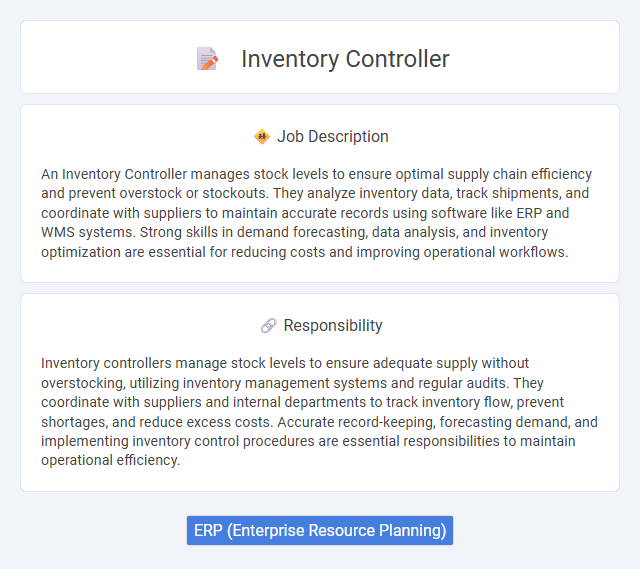
An Inventory Controller manages stock levels to ensure optimal supply chain efficiency and prevent overstock or stockouts. They analyze inventory data, track shipments, and coordinate with suppliers to maintain accurate records using software like ERP and WMS systems. Strong skills in demand forecasting, data analysis, and inventory optimization are essential for reducing costs and improving operational workflows.
Individuals with strong organizational skills and attention to detail are likely well-suited for the role of an inventory controller, as the job involves managing stock levels and ensuring accuracy in records. Those who thrive under pressure, can analyze data, and have good communication abilities may find this position aligns with their capabilities. Conversely, people who struggle with multitasking or have difficulty maintaining focus might find the job challenging and less fitting for their strengths.
Qualification
Inventory controllers require strong analytical skills and proficiency in inventory management software such as SAP or Oracle. A background in supply chain management or logistics, often supported by a bachelor's degree in business or industrial engineering, is highly preferred. Attention to detail and experience in forecasting, stock control, and reporting are essential qualifications to optimize inventory accuracy and reduce carrying costs.
Responsibility
Inventory controllers manage stock levels to ensure adequate supply without overstocking, utilizing inventory management systems and regular audits. They coordinate with suppliers and internal departments to track inventory flow, prevent shortages, and reduce excess costs. Accurate record-keeping, forecasting demand, and implementing inventory control procedures are essential responsibilities to maintain operational efficiency.
Benefit
Inventory controller roles likely provide significant benefits such as improved organizational efficiency and reduced operational costs through accurate tracking and management of stock levels. Enhanced data accuracy in inventory records may lead to better decision-making and forecasting, increasing overall business profitability. The position probably offers career growth opportunities and skill development in supply chain management, making it valuable for long-term professional advancement.
Challenge
Inventory controller roles may present challenges related to accurate demand forecasting, which can require advanced analytical skills and the capacity to manage fluctuating supply chain dynamics. The position probably involves balancing inventory levels to minimize costs while avoiding stockouts, a task that demands precise decision-making under uncertainty. Responsibilities could also include adapting to sudden market changes or disruptions, requiring agility and proactive problem-solving abilities.
Career Advancement
Inventory controller positions offer significant career advancement opportunities in supply chain management, logistics, and operations roles. Mastery of inventory control systems and data analytics can lead to promotions such as Inventory Manager, Supply Chain Analyst, or Operations Manager within large manufacturing and retail companies. Developing skills in forecasting, procurement, and ERP software enhances prospects for leadership roles and higher salary brackets.
Key Terms
ERP (Enterprise Resource Planning)
An Inventory Controller specializing in ERP systems manages stock levels, tracks inventory movements, and ensures accurate data integration within platforms like SAP, Oracle, or Microsoft Dynamics. Proficiency in ERP software enables seamless coordination between procurement, warehouse, and finance departments, optimizing supply chain efficiency and reducing operational costs. Real-time inventory reporting and data analytics through ERP tools support strategic decision-making and demand forecasting.
 kuljobs.com
kuljobs.com